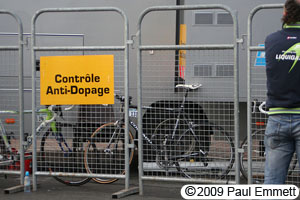 For many years human growth hormone (hGH) has been used in sport without any fear of detection, but those days have now come to an end.
For many years human growth hormone (hGH) has been used in sport without any fear of detection, but those days have now come to an end.
UK Anti-Doping today announced the first ever sanction for the substance, with Wakefield Trinity Wildcats rugby player Terry Newton accepting a two year ban.
The sample in question was taken during out of competition testing on 24 November 2009. Newton accepted blame last Friday, marking a major breakthrough for the fight against doping.
Anti-doping scientists have long been searching for a method to detect the substance, which strengthens muscle and promotes recovery. Up until now it had proven elusive in tests.
HGH was seized twelve years ago in the Festina raids, and has been picked up in several other swoops involving cyclists.
As UK Anti-Doping Chief Executive Andy Parkinson stated, the news is of serious importance to sport. “This is a landmark in the fight against doping,” he asserted. “It is the world-first analytical positive for hGH, a substance that has previously gone undetected because it leaves the system fairly quickly after administration.”
“This positive finding was a combination of intelligence, target testing and a strong partnership with the anti-doping scientific community and the RFL [Rugby Football League]. Athletes using hGH should take Newton’s experience as a stern warning – if you use hGH you will not get away with it.”
King’s College London Drug Control Centre Director Professor David Cowan explained that much work had to be done to reach this point, not least because of the similarity of exogenous hGH to the body’s own supply.
“This is an exciting major breakthrough that has been the result of many years of careful research with WADA,” he stated. “The detection of substances that are virtually identical to our natural hormones has always represented a challenge.
“This shows how science has closed an important gap and further enhances our ability to deter the cheating athlete to ensure the integrity of sport and promote healthy competition.”
Any professional riders who have been using the substance face two big threats. The first is that there are no longer any guarantees that hGH can be used without detection. Secondly, the possibility of retroactive testing means that races already concluded can be revisted, and riders who stood on the podium can be disqualified from that result and banned from cycling.
Today’s UK Anti-Doping release points out that most WADA-accredited laboratories can now test for the substance, news which will lead to some sleepless nights for athletes who felt they were ahead of the game.
WADA Director General David Howman promised that those sportsmen and women doping with the hormone would be detected.
“This first completed case involving an analytical finding for human growth hormone (hGH) is a positive step in the global fight against doping in sport,” said Howman in a WADA statement. “It sends a strong message to those athletes who take the risk to misuse hGH that we will ultimately catch them. WADA and the anti-doping community have committed significant resources to the development of detection means for hGH.”
Howman continued by leaving the door open for retroactive testing: “I suggest to cheaters to keep in mind that the World Anti-Doping Code makes it possible to open a disciplinary proceeding within eight years from the date an anti-doping rule violation occurred, and that stored samples can be reanalyzed.”
Tour de France organisers ASO have promised for many years that they would consider conducting retroactive testing when new methods of detection were found.